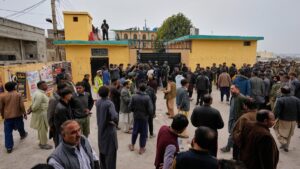Journalism vs. Content Creation: Know the Difference!

Protect the Truth: Not All Who Report Are Journalists!
In today’s digital age, where everyone with a smartphone and internet access can broadcast information, the lines between journalism and content creation have blurred. In Kashmir, this confusion is particularly dangerous, as misinformation can have serious consequences in a region already struggling with political turmoil and media restrictions.
The truth is simple: “not everyone with a camera or a press card is a journalist. The distinction between a journalist and a content creator is crucial, and the public must learn to differentiate between the two.”
Said Photojournalist Faisal Bashir , Faisal is completed Bachelor’s Degree in Journalism and currently working SOPA images
“Journalism and content creation are fundamentally different. While content creators may not require a degree, journalism often involves 4-5 years of formal education. If every content creator considers themselves a journalist, then what value does formal journalism hold? Without understanding the ethics of journalism, how can someone with just a mic and a phone claim to be a journalist? It simply doesn’t add up.”
Said Multimedia journalist Mufferah Majeed Khuroo she is pursuing a bachelor’s degree in journalism and mass communication.
Journalism is a Profession, Not a Trend
Journalism is not just a label—it is a profession governed by ethics, laws, and a responsibility to the truth. Journalists do not merely relay information; they investigate, verify facts, and hold power to account, often at great personal risk. A true journalist prioritizes accuracy over popularity, truth over engagement, and public interest over personal gain.
On the other hand, content creators work with a different goal: audience engagement. Their success is often measured in views, likes, and shares, rather than the depth and reliability of their reporting. While not all content creators are dishonest, their work is driven by algorithms, trends, and sometimes even personal biases, rather than the strict ethical framework that defines journalism.
Sensationalism vs. Accountability
A key difference between journalists and content creators is their approach to storytelling. Journalists are required to cross-check facts, provide balanced perspectives, and ensure their reports serve the public good. Their work is held to legal and professional scrutiny, and they can face consequences for unethical reporting.
Content creators, however, often thrive on sensationalism. Many who claim to be “journalists” in Kashmir disguise entertainment as news, twist facts for engagement, or spread outright lies to attract attention. Their goal is not to inform, but to provoke reactions—whether through emotional manipulation, exaggerated narratives, or biased storytelling. This is not journalism; it is deception.
The Danger of Misinformation in Kashmir
In a place like Kashmir, where truth is already under siege, the spread of misinformation is not just irresponsible—it is dangerous. Confusing content creators with journalists can lead people to trust unreliable sources, make decisions based on false information, and ultimately contribute to an already chaotic media landscape.
This is not to say that all content creators are bad. Many provide valuable perspectives, document important issues, and share untold stories. However, their work should not be mistaken for professional journalism. The distinction lies not in what they call themselves, but in the integrity and credibility of their work.
Why This Distinction Matters
Journalism is a pillar of democracy and accountability. When real journalists are undermined by those who exploit the title for personal gain, the public loses access to reliable information. In a conflict-ridden place like Kashmir, where narratives are weaponized and truth is contested, ethical journalism is more important than ever.
The people of Kashmir must learn to question sources, verify information, and support responsible journalism over viral content. Anything less than fact-based, ethical reporting is not journalism—it is entertainment at best and propaganda at worst. Understanding this difference is not just a matter of media literacy; it is a necessity for safeguarding truth in one of the most complex regions of the world.
Protecting Professional Journalism and Ourselves from Misinformation
In an era where social media and digital platforms dominate the flow of information, protecting professional journalism and safeguarding ourselves from misleading content creators is more important than ever. In a region like Kashmir, where media narratives can shape public perception and even fuel conflicts, distinguishing real journalism from sensationalism is critical. Here’s how we can do it:
1. Support Ethical Journalism
- Follow reputable news sources – Stick to established media houses that follow journalistic ethics and have a record of credible reporting.
- Subscribe to trustworthy journalism – Many independent journalists and organizations rely on public support. Subscribing to or donating to reliable media platforms helps them continue their work.
- Demand transparency – A real journalist will be open about their sources, research methods, and corrections when mistakes happen.
2. Verify Before You Trust
- Cross-check information – If a story is shocking or sensational, verify it through multiple credible sources before believing or sharing it.
- Check the source – Who is publishing the information? Is it a recognized news organization, a government body, or just a random social media page?
- Look for evidence – Journalism is based on facts, data, and credible sources. If a post lacks sources or relies solely on emotions, be skeptical.
3. Recognize the Signs of Fake Journalism
Many self-proclaimed “journalists” on social media prioritize engagement over truth. Be cautious if:
- They frequently post sensational or exaggerated headlines without proper evidence.
- Their content plays to emotions rather than presenting facts.
- They avoid criticism and block or attack those who question them.
- They have no history of real investigative reporting and rely only on opinions or unverified claims.
- They edit or manipulate visuals to mislead audiences.
4. Use Social Media Wisely
- Unfollow unreliable sources – If a Facebook page or content creator regularly shares misinformation, stop engaging with them.
- Report misleading content – Social media platforms allow users to report false news.
- Educate others – Encourage your friends and family to verify news before sharing it. Misinformation spreads quickly when people blindly forward content.
5. Push for Media Literacy in Kashmir
- Encourage critical thinking – Schools, colleges, and community organizations should promote media literacy.
- Hold local media accountable – If a journalist or media outlet spreads misinformation, call them out and demand corrections.
- Promote ethical journalism training – Workshops, discussions, and awareness campaigns can help educate young journalists and the public on responsible reporting.
6. Separate Opinion from Fact
- Understand that content creators are not journalists – While they may provide insights or personal perspectives, their content is often opinion-based rather than fact-driven.
- Recognize propaganda – Some social media influencers or so-called journalists may push political or personal agendas under the guise of reporting.
7. Advocate for Press Freedom and Protection of Real Journalists
- Speak up against attacks on journalists – Professional journalists often face threats for reporting the truth. Supporting them publicly can help.
- Encourage journalistic ethics – Media organizations should be pressured to maintain high ethical standards and avoid becoming tools of propaganda.
Kashmir, like many other places, is facing a battle between truth and misinformation. Professional journalism is essential for democracy, accountability, and informed decision-making. By supporting ethical journalists, verifying news before sharing, and educating ourselves about media manipulation, we can protect both journalism and ourselves from the dangers of social media-driven misinformation.
The responsibility lies with all of us. In an age of misinformation, being an informed reader is just as important as being a responsible journalist.





